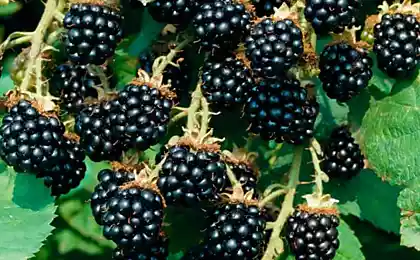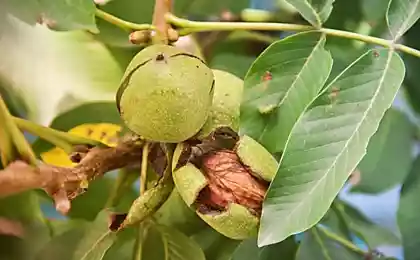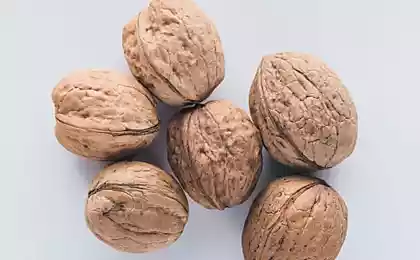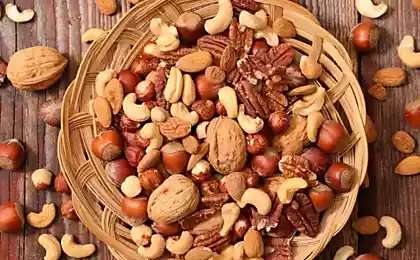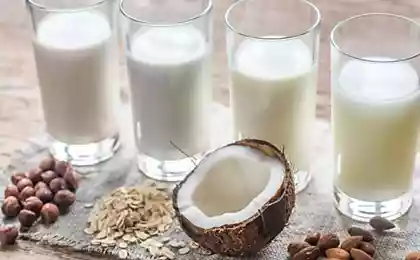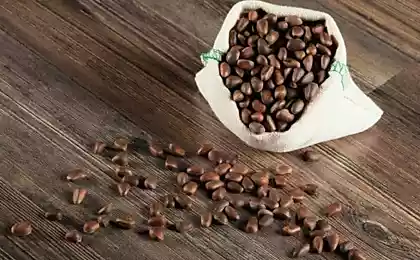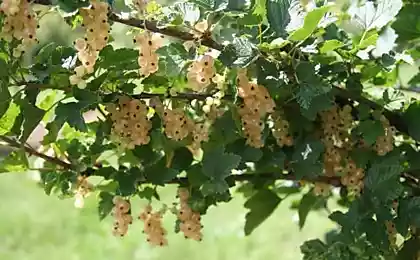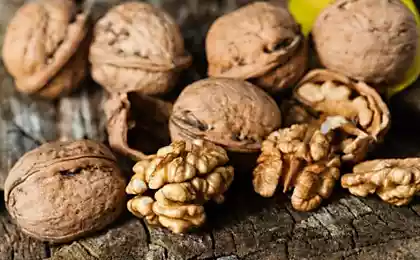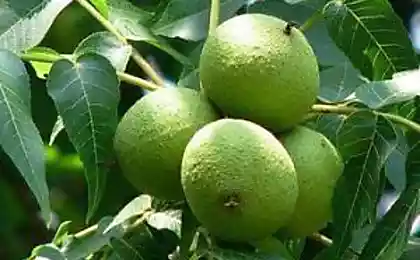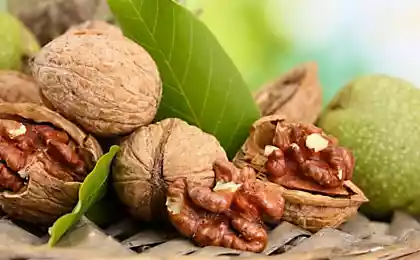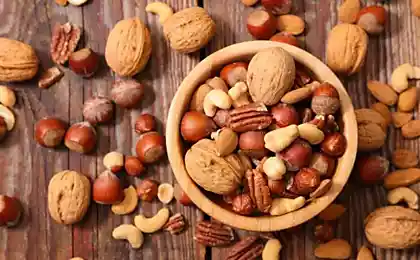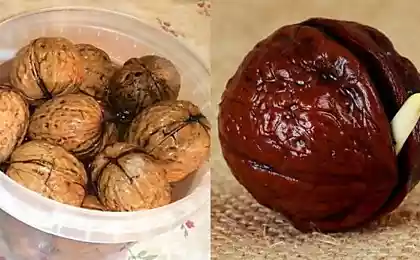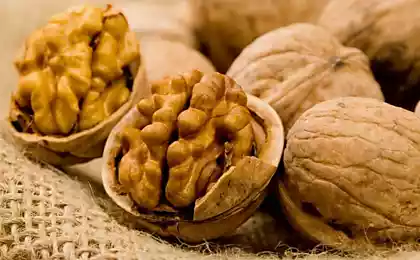257
Walnut leaves: a natural drug, behind which it is only necessary to extend a hand. It's time to prepare them for the future.
The walnut (Juglans regia), also known as king-nutThe tree of life is designed to treat many ailments of our body. Everything is useful in this tree: leaves, kernels, partitions, amnioarth of a nut, its ovary and even bark.
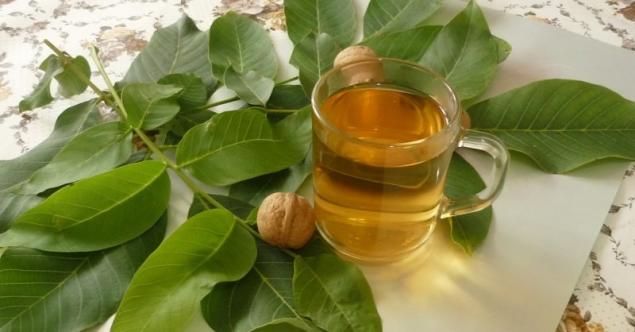
Nut leaves, in addition to the therapeutic effect on the human body, help us clean the air and kill bacteria, and added to the water, disinfect it. It is no coincidence that flies, mosquitoes and moths do not tolerate even the smell of a nut tree.
Harvested walnut leaves in June, even before reaching final development, quickly dried in the sun, paying attention to the fact that they do not turn black.
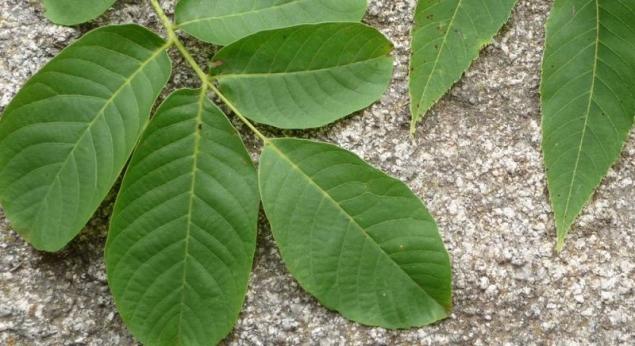 .
.
The leaves of the king nut are used as an excellent source of vitamin C, not inferior to black currants. The maximum amount of vitamin in them is contained during the collection of leaves.
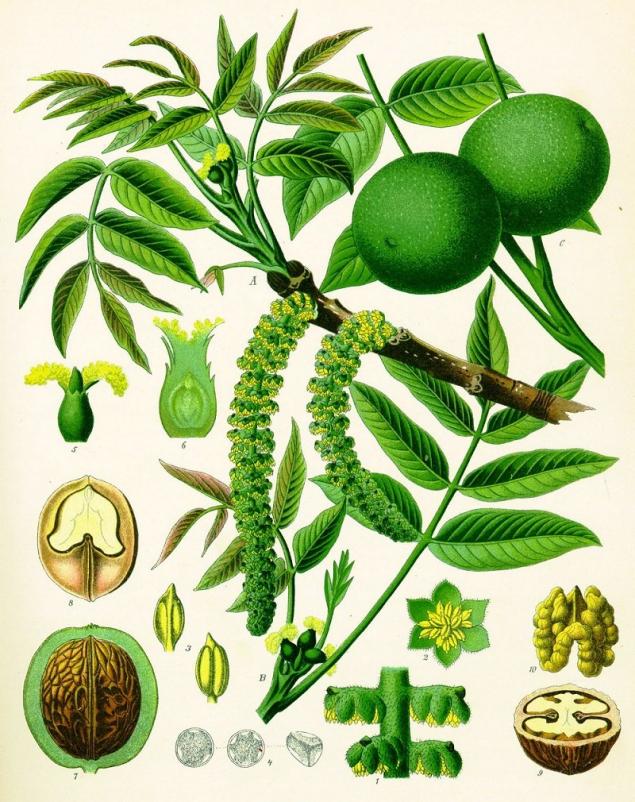
In addition, the leaves are rich in carotene, vitamins B1, P, essential oils, contain quinones (yuglon), phenolcarboxylic acids, coumarins, flavonoids, ellagic, halusic and caffeic acids.
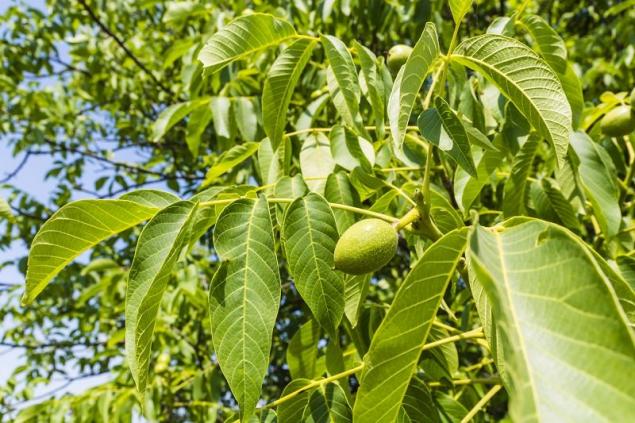
DepositPhotos
Vitamin C increases the stability of the body, strengthens the vascular walls (along with vitamin P), favorably affects the liver and kidneys. Vitamin B1 plays an important role in the nutrition of the nervous system, is useful for the heart, blood vessels and digestive system.
Carotene is an antioxidant and immunostimulant. The tannins of nut leaves have astringent properties. Nut leaf phytoncides and yuglon are effective against many bacteria, and essential oils are considered natural repellents.
Due to the special composition of walnut leaves have the following useful properties:
The healing properties of walnut leaves have long been known. The fact that nut leaves give an astringent effect and stop bleeding, wrote Avicenna.
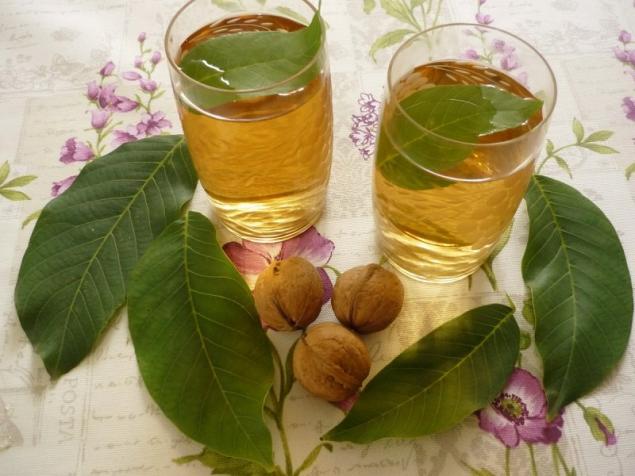
In countries where walnut grows, its foliage has been used for centuries to heal wounds, relieve and treat dysentery, poisoning and improve digestion.
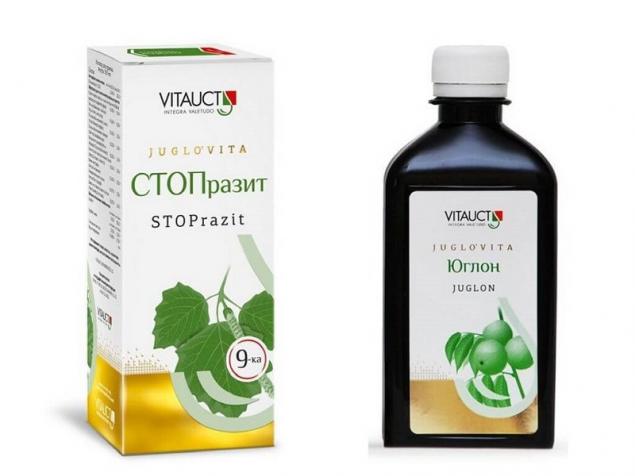
In modern medicine, nut leaves are actively used, including in pharmacology. In pharmacies, you can buy an oil or alcohol solution "Yuglon", prepared on the basis of nut leaves. It is indicated for the treatment of periodontal disease and skin diseases.
Application in folk medicine Walnut leaves are used in a variety of variations. For example, they make a decoction. To do this, take a teaspoon of dried crushed leaves, brew them with steep boiling water and let them stand for an hour, then strain carefully.
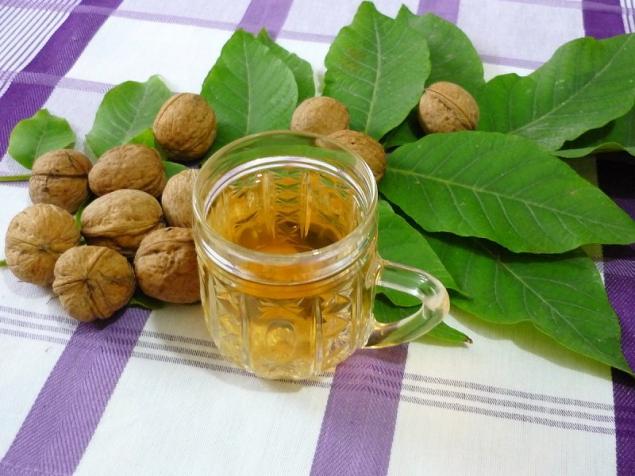
Apply this decoction is recommended for the following diseases:
Use this decoction also to get rid of worms, as well as simply in the form of a fortifying agent. It is noteworthy that the decoction can be used externally.
For example, they strengthen the hair if they fall out, wipe the face in the presence of acne or diathesis, and also rinse the throat if it hurts. This tool is also used when boils and non-healing wounds occur.
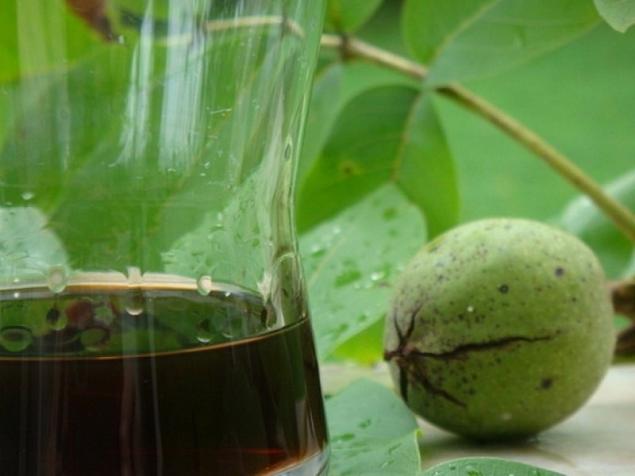
From the leaves of the plant, you can make ordinary tea. To do this, 1 tablespoon of raw materials is brewed with 1 cup of boiling water and insist for 10 minutes. After straining, you need to drink the received remedy up to 3 times a day. You can add chamomile broth to tea to increase its effectiveness.
Oil and alcohol tinctures are also prepared from nut leaves. In order to prepare an oil tincture, you need to take about 80 grams of crushed but fresh nut leaves and pour them with refined vegetable oil in the amount of 300 milliliters.
The resulting mixture should be tightly closed with a lid and left at room temperature, but without sunlight for 20-25 days. After infusion, this tool is suitable for both internal and external use.
In the latter embodiment, this infusion can be used to treat acne, acne, as well as wounds that do not heal for a long time, and boils. To do this, tincture should be applied to the affected areas of the skin.
Relieve gastric and intestinal pain, eliminate diarrhea and improve the digestive process allows you to tincture vodka. Dried raw materials are poured with vodka in a ratio of 1 to 10 and infused for 2 weeks. Drink the medicine should be 10 drops diluted in water, 3-4 times a day. The course duration is 14 days.
Drugs intended for oral administration have contraindications. Due to the specific properties of walnut leaves are prohibited for people with increased blood clotting and thrombophlebitis.
Washing on the basis of walnut leaves and other means for external use have no contraindications, if you do not take into account individual intolerance.
Tincture of walnut partitions will protect against all diseases! This popular recipe has proven its effectiveness not one generation of our ancestors.
This is why you should add nuts to your dishes. We invite you to learn more interesting facts about the influence of the most popular types of nuts on the body. Choose the right nuts and include in your diet!

Nut leaves, in addition to the therapeutic effect on the human body, help us clean the air and kill bacteria, and added to the water, disinfect it. It is no coincidence that flies, mosquitoes and moths do not tolerate even the smell of a nut tree.
Harvested walnut leaves in June, even before reaching final development, quickly dried in the sun, paying attention to the fact that they do not turn black.
 .
.The leaves of the king nut are used as an excellent source of vitamin C, not inferior to black currants. The maximum amount of vitamin in them is contained during the collection of leaves.

In addition, the leaves are rich in carotene, vitamins B1, P, essential oils, contain quinones (yuglon), phenolcarboxylic acids, coumarins, flavonoids, ellagic, halusic and caffeic acids.

DepositPhotos
Vitamin C increases the stability of the body, strengthens the vascular walls (along with vitamin P), favorably affects the liver and kidneys. Vitamin B1 plays an important role in the nutrition of the nervous system, is useful for the heart, blood vessels and digestive system.
Carotene is an antioxidant and immunostimulant. The tannins of nut leaves have astringent properties. Nut leaf phytoncides and yuglon are effective against many bacteria, and essential oils are considered natural repellents.
Due to the special composition of walnut leaves have the following useful properties:
- antifungal;
- hemostatic;
- wound-healing;
- immunostimulating;
- painkillers;
- Helminthic.
- Astringent.
The healing properties of walnut leaves have long been known. The fact that nut leaves give an astringent effect and stop bleeding, wrote Avicenna.

In countries where walnut grows, its foliage has been used for centuries to heal wounds, relieve and treat dysentery, poisoning and improve digestion.

In modern medicine, nut leaves are actively used, including in pharmacology. In pharmacies, you can buy an oil or alcohol solution "Yuglon", prepared on the basis of nut leaves. It is indicated for the treatment of periodontal disease and skin diseases.
Application in folk medicine Walnut leaves are used in a variety of variations. For example, they make a decoction. To do this, take a teaspoon of dried crushed leaves, brew them with steep boiling water and let them stand for an hour, then strain carefully.

Apply this decoction is recommended for the following diseases:
- atherosclerosis of cerebral vessels;
- diarrhea;
- diabetes mellitus;
- various diseases of the gastrointestinal tract;
- internal bleeding.
Use this decoction also to get rid of worms, as well as simply in the form of a fortifying agent. It is noteworthy that the decoction can be used externally.
For example, they strengthen the hair if they fall out, wipe the face in the presence of acne or diathesis, and also rinse the throat if it hurts. This tool is also used when boils and non-healing wounds occur.

From the leaves of the plant, you can make ordinary tea. To do this, 1 tablespoon of raw materials is brewed with 1 cup of boiling water and insist for 10 minutes. After straining, you need to drink the received remedy up to 3 times a day. You can add chamomile broth to tea to increase its effectiveness.
Oil and alcohol tinctures are also prepared from nut leaves. In order to prepare an oil tincture, you need to take about 80 grams of crushed but fresh nut leaves and pour them with refined vegetable oil in the amount of 300 milliliters.
The resulting mixture should be tightly closed with a lid and left at room temperature, but without sunlight for 20-25 days. After infusion, this tool is suitable for both internal and external use.
In the latter embodiment, this infusion can be used to treat acne, acne, as well as wounds that do not heal for a long time, and boils. To do this, tincture should be applied to the affected areas of the skin.
Relieve gastric and intestinal pain, eliminate diarrhea and improve the digestive process allows you to tincture vodka. Dried raw materials are poured with vodka in a ratio of 1 to 10 and infused for 2 weeks. Drink the medicine should be 10 drops diluted in water, 3-4 times a day. The course duration is 14 days.
Drugs intended for oral administration have contraindications. Due to the specific properties of walnut leaves are prohibited for people with increased blood clotting and thrombophlebitis.
Washing on the basis of walnut leaves and other means for external use have no contraindications, if you do not take into account individual intolerance.
Tincture of walnut partitions will protect against all diseases! This popular recipe has proven its effectiveness not one generation of our ancestors.
This is why you should add nuts to your dishes. We invite you to learn more interesting facts about the influence of the most popular types of nuts on the body. Choose the right nuts and include in your diet!
Scientists from the University of California told why bacteria and viruses can not escape
Original eggs for a hearty breakfast. There's a little secret to amazing taste.


